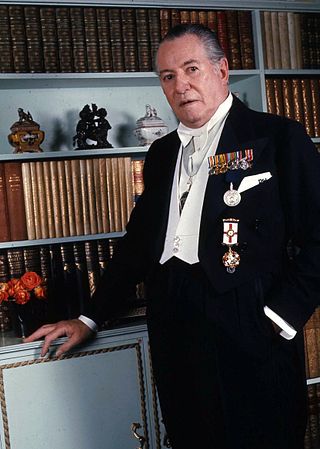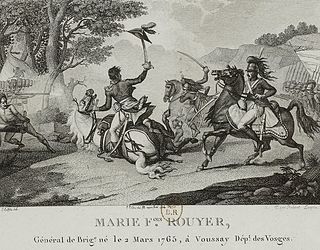
The Napoleonic Wars (1803–1815) were a series of conflicts fought between the First French Empire under Napoleon (1804–1815) and a fluctuating array of European coalitions. The wars originated in political forces arising from the French Revolution (1789–1799) and from the French Revolutionary Wars (1792–1802), and produced a period of French domination over Continental Europe. The wars are categorised as seven conflicts, five named after the coalitions that fought Napoleon, plus two named for their respective theatres; the War of the Third Coalition, War of the Fourth Coalition, War of the Fifth Coalition, War of the Sixth Coalition, War of the Seventh Coalition, the Peninsular War, and the French invasion of Russia.

André Masséna, Prince of Essling, Duke of Rivoli, was a French military commander during the French Revolutionary Wars and the Napoleonic Wars. He was one of the original 18 Marshals of the Empire created by Napoleon I. He was nicknamed l'Enfant chéri de la Victoire. He is often considered as one of the greatest generals of the Revolutionary and Napoleonic Wars.

The Napoleonic era is a period in the history of France and Europe. It is generally classified as including the fourth and final stage of the French Revolution, the first being the National Assembly, the second being the Legislative Assembly, and the third being the Directory. The Napoleonic era begins roughly with Napoleon Bonaparte's coup d'état, overthrowing the Directory, establishing the French Consulate, and ends during the Hundred Days and his defeat at the Battle of Waterloo. The Congress of Vienna soon set out to restore Europe to pre-French Revolution days. Napoleon brought political stability to a land torn by revolution and war. He made peace with the Roman Catholic Church and reversed the most radical religious policies of the Convention. In 1804 Napoleon promulgated the Civil Code, a revised body of civil law, which also helped stabilize French society. The Civil Code affirmed the political and legal equality of all adult men and established a merit-based society in which individuals advanced in education and employment because of talent rather than birth or social standing. The Civil Code confirmed many of the moderate revolutionary policies of the National Assembly but retracted measures passed by the more radical Convention. The code restored patriarchal authority in the family, for example, by making women and children subservient to male heads of households.

Louis-Alexandre Berthier, Prince of Neuchâtel and Valangin, Prince of Wagram, was a French military commander who served during the French Revolutionary Wars and the Napoleonic Wars. He was twice Minister of War of France and was made a Marshal of the Empire in 1804. Berthier served as chief of staff to Napoleon Bonaparte from his first Italian campaign in 1796 until his first abdication in 1814. The operational efficiency of the Grande Armée owed much to his considerable administrative and organizational skills.

Joseph Fouché, 1st Duc d'Otrante, 1st Comte Fouché was a French statesman, revolutionary, and Minister of Police under First Consul Napoleon Bonaparte, who later became a subordinate of Emperor Napoleon. He was particularly known for the ferocity with which he suppressed the Lyon insurrection during the Revolution in 1793 and for being minister of police under the Directory, the Consulate, and the Empire. In 1815, he served as President of the Executive Commission, which was the provisional government of France installed after the abdication of Napoleon. In English texts, his title is often translated as Duke of Otranto.

Dennis Yates Wheatley was a British writer whose prolific output of thrillers and occult novels made him one of the world's best-selling authors from the 1930s through to the 1960s.
Baron Paul Davidovich or Pavle Davidović became a general of the Austrian Empire and a Knight of the Military Order of Maria Theresa. He played a major role in the 1796 Italian campaign during the French Revolutionary Wars, leading corps-sized commands in the fighting against the French army led by Napoleon Bonaparte. He led troops during the Napoleonic Wars and was Proprietor (Inhaber) of an Austrian infantry regiment.

The First French Empire, officially the French Republic, then the French Empire after 1809 and also known as Napoleonic France, was the empire ruled by Napoleon Bonaparte, who established French hegemony over much of continental Europe at the beginning of the 19th century. It lasted from 18 May 1804 to 3 May 1814 and again briefly from 20 March 1815 to 7 July 1815, when Napoleon was exiled to St. Helena.

Claude Juste Alexandre Louis Legrand was a French general. He commanded French divisions at several notable battles of the French Revolutionary and Napoleonic Wars. Napoléon made him a Count of the Empire in 1808. He rose to senator on 5 April 1813, then Pair de France on 4 June 1814 and chevalier de Saint-Louis on 27 June 1814. He organised the defence of Chalon-sur-Saône in 1814 and died in Paris in 1815 of wounds received beside the River Berezina.
For his life and a basic reading list see Napoleon I of France

Heinrich XV, Prince Reuss of Greiz was the fourth of six sons born into the reigning family of the Principality of Reuss. At the age of fifteen he joined the army of the Habsburg monarchy and later fought against Ottoman Turkey. During the French Revolutionary Wars he became a general officer and saw extensive service. He commanded a corps during the Napoleonic Wars. From 1801 until his death, he was Proprietor (Inhaber) of an Austrian infantry regiment.

Charles Eugène of Lorraine was the head of and last male member of the House of Guise, the cadet branch of the House of Lorraine which dominated France during the Wars of Religion, remained prominent as princes étrangers at court throughout the ancien régime, and participated in the émigré efforts to restore the Bourbons to the throne. He was an officer in the French and Habsburg militaries during the French Revolutionary and Napoleonic wars.

Count Ignác Gyulay de Marosnémeti et Nádaska, Ignácz Gyulay, Ignaz Gyulai was a Hungarian military officer, joined the army of the Habsburg monarchy, fought against Ottoman Turkey, and became a general officer during the French Revolutionary Wars. From 1806 he held the title of Ban of Croatia. In the struggle against the First French Empire during Napoleonic Wars, he commanded army corps. At the time of his death, he presided over the Hofkriegsrat, the Austrian Council of War.
Friedrich Karl Wilhelm, Fürst (prince) zu Hohenlohe-Ingelfingen was a general in the military service of the House of Habsburg during the French Revolutionary Wars and the Napoleonic Wars. He was born in Ingelfingen, in southwest Germany, on 16 February 1752.

Marie François Rouyer was a French general during the Napoleonic Wars.

Pascal Antoine Fiorella or Pasquale Antonio, comte Fiorella became a French general officer in the French Revolutionary Wars and led a brigade during Napoleon Bonaparte's famous campaign in Italy in 1796. A Corsican by birth, he joined the French Royal Army as a volunteer in 1770 and was quickly appointed an officer. When the French Revolution broke out, he was a captain. Elected lieutenant colonel of a volunteer battalion, he fought with the Army of the Alps. Transferred to the Army of Italy, he assumed command of the 46th Line Infantry Demi-Brigade in February 1794. He fought under André Masséna at Saorgio where he was wounded. In September 1794 he earned promotion to general of brigade and led the army reserve.

Johann Nepomuk von Nostitz-Rieneck commanded a cavalry division in the army of the Austrian Empire during the Napoleonic Wars.
The Napoleonic Wars were a defining event of the early 19th century, and inspired many works of fiction, from then until the present day.

Henri François Marie Charpentier became a French chief of staff during the French Revolutionary Wars and a division commander during the Napoleonic Wars. In 1791 he joined a volunteer battalion and later became a staff officer. He served as Jacques Desjardin's chief of staff when that general served as commander of the right wing of the Army of the North during the battles of Grandreng, Erquelinnes and Gosselies in 1794. Next year he was Jacques Maurice Hatry's chief of staff during the Siege of Luxembourg. He was promoted to general of brigade and fought at the Trebbia and Novi in 1799 and fought at Montebello and Marengo in 1800. Napoleon appointed him general of division in 1804.















